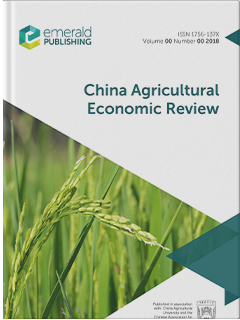稻农健康脆弱性与健康贫困:来自湖北省的证据
IF 4.6
2区 经济学
Q1 AGRICULTURAL ECONOMICS & POLICY
引用次数: 2
摘要
目的本研究的目的有三个:(1)测量农民的健康贫困程度,(2)研究健康脆弱性对健康贫困的影响;(3)确定缓解中国农村健康贫困的对策。设计/方法/方法本研究建立了一个基于多维贫困框架的健康贫困测度模型,用于评估农民的健康脆弱性。此外,本文使用计量经济学模型来评估健康脆弱性对健康贫困的影响。本研究的样本包括来自湖北省的1115名稻农。结果表明,医疗负担能力贫困率为17.95%,其中低收入群体的农民面临严重的医疗负担能力贫穷(27.46%)。多维分析结果显示,健康贫困率分别为17.95%和30.50%。我们的研究结果表明,气候变化的脆弱性、生活习惯、医疗设施和医疗可及性与健康贫困呈正相关,而定期体检减少了心理健康贫困。研究局限性/含义基于本研究的发现,我们提出:(1)为了解决农业社区成员中由疾病引发的贫困问题,应制定并实施基于多维健康贫困框架的国家和省级战略和计划,(2)健康知识交流机制有利于农民健康状况的改善,(3)应采用稳健和全面的指标来了解和提高农民吸收和减轻负面健康影响的能力;(4)提高医疗设施的质量和数量以及农村地区的医疗负担能力应是政府范围内举措的关键优先事项。原创性/价值现有的减轻疾病造成的贫困的研究主要集中在疾病发生后对那些经济脆弱性的医疗服务支持上。然而,很少有研究关注疾病造成贫困的根本原因,特别是从健康脆弱性的预防角度。为了填补这一空白,本研究提出了健康贫困指数,并分析了健康脆弱性对健康贫困的影响。本文章由计算机程序翻译,如有差异,请以英文原文为准。
Health vulnerability and health poverty of rice farmers: evidence from Hubei province in China
PurposeThe purpose of this study was threefold: (1) to measure farmers' health poverty, (2) to examine the effect of health vulnerability on health poverty and (3) to identify countermeasures that may alleviate health poverty in rural China.Design/methodology/approachThis study built a health poverty measurement model based on the multi-dimensional poverty framework to evaluate farmers' health vulnerability. Further, this paper used an econometric model to assess the impact of health vulnerability on health poverty. The sample for this study comprised 1,115 rice farmers from Hubei province, China.FindingsThe medical affordability poverty ratio was 17.95%, where farmers in the low-income group faced severe medical affordability poverty (27.46%). Results from the multi-dimensional analysis showed that, the health poverty ratios were 17.95 and 30.50%, respectively. Our results indicated that climate change vulnerabilities, living habits, medical facilities and medical accessibility were positively related to health poverty, whereas the regular physical examinations reduced mental health poverty.Research limitations/implicationsBased on this study's findings, we proposed that: (1) to address illness-induced poverty among members of the agricultural community, national and provincial strategies and programs grounded on a multi-dimensional health poverty framework ought to be formulated and implemented, (2) mechanisms of health knowledge exchange may facilitate the improvement of farmers' health status, (3) robust and comprehensive metrics should be employed to understand and improve farmers' ability to absorb and mitigate the negative health impacts and (4) the improvement in both quality and quantity for medical facilities and medical affordability in the rural areas should be key priorities in governmental-wide initiatives.Originality/valueExisting studies for alleviating poverty caused by disease mainly focus on medical service support to those economic vulnerabilities after a disease happens. However, few studies have focused on the root causes of poverty caused by disease, particularly from the preventive perspective of health vulnerability. To fill this gap, this study, therefore, proposes the health poverty index and analyzes the impact of health vulnerability on health poverty.
求助全文
通过发布文献求助,成功后即可免费获取论文全文。
去求助
来源期刊

China Agricultural Economic Review
AGRICULTURAL ECONOMICS & POLICY-
CiteScore
9.80
自引率
5.90%
发文量
41
审稿时长
>12 weeks
期刊介绍:
Published in association with China Agricultural University and the Chinese Association for Agricultural Economics, China Agricultural Economic Review publishes academic writings by international scholars, and particularly encourages empirical work that can be replicated and extended by others; and research articles that employ econometric and statistical hypothesis testing, optimization and simulation models. The journal aims to publish research which can be applied to China’s agricultural and rural policy-making process, the development of the agricultural economics discipline and to developing countries hoping to learn from China’s agricultural and rural development.
 求助内容:
求助内容: 应助结果提醒方式:
应助结果提醒方式:


